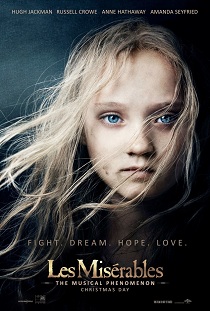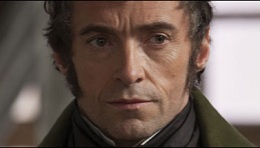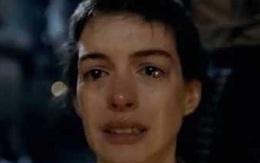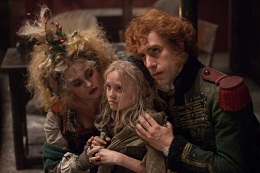 The 1980s smash-hit stage musical Les Misérables arrives on the big screen in a punishing movie adaptation from director Tom Hooper (The King’s Speech) that may very well prove to be the “adult” equivalent of the Twilight series.
The 1980s smash-hit stage musical Les Misérables arrives on the big screen in a punishing movie adaptation from director Tom Hooper (The King’s Speech) that may very well prove to be the “adult” equivalent of the Twilight series.
Actually, Les Misérables isn’t as grounded emotionally as the first Twilight movie, which at least made for a semi-convincing allegory, raising teen alienation to the level of ridiculous supernatural romantic fantasy. Les Misérables is nothing but a punishing display of actorly “raw” emotion, ploddingly staged, and stuck in an endless spin-dry cycle.
Hopper, by way of the stage play by Claude-Michel Schonberg, Alain Boublil, and Jean-Marc Natel, reduces Victor Hugo’s expansive 1862 novel about meaningful redemption into a claustrophobic soap opera where characters sing about their connections to one another rather than actually developing them.
In early 19th-century France, Jean Valjean (Hugh Jackman) goes from emaciated convict to rehabilitated upperclassman while Javert (Russell Crowe), a former guard, is obsessed with bringing him down. Because you see, in his eyes, people can’t change.
 But change Valjean does, swooping in to save the daughter of Fantine, one of his unfortunate factory workers (Anne Hathaway), who creates climax number one of Les Misérables about 40 minutes in with her go-for-broke rendition of the play’s iconic pity party “I Dreamed A Dream.” The problem is, we’ve barely spent any time with the woman and she’s practically begging us for our tears. Later in the film, we are supposed to believe a relationship between Valjean and her daughter (Amanda Seyfried) exists when no proof is found onscreen. Don’t even get me started on the underdeveloped love triangle.
But change Valjean does, swooping in to save the daughter of Fantine, one of his unfortunate factory workers (Anne Hathaway), who creates climax number one of Les Misérables about 40 minutes in with her go-for-broke rendition of the play’s iconic pity party “I Dreamed A Dream.” The problem is, we’ve barely spent any time with the woman and she’s practically begging us for our tears. Later in the film, we are supposed to believe a relationship between Valjean and her daughter (Amanda Seyfried) exists when no proof is found onscreen. Don’t even get me started on the underdeveloped love triangle.
For two and a half hours, Les Misérables roughly follows the pattern it set with everything leading up to climax number one. Misery. Heartbreak. Melodrama. Extended high note. Manipulative death. Repeat. Except in the second cycle, it adds the Rousing Chorus, which plasters blustery lyrics on top of a bunch of kids playing dress-up in French revolutionary costumes.
 Lest you think that I’m just slamming elements that already existed in the play, let’s get specific about why Hooper’s version is such a numbing experience.
Lest you think that I’m just slamming elements that already existed in the play, let’s get specific about why Hooper’s version is such a numbing experience.
Movies succeed emotionally when they transcend the performance experience, not when they point out how fabricated they are. (Not all movies need to connect emotionally in order to succeed, but that’s another conversation. Les Misérables is clearly going for emotion.) It’s already a stumbling block that the actors have to sing snippets of dialogue to connect the 50 or so musical numbers: That’s not exactly natural and it eliminates precious moments where we could relate to them without annoying lyrical platitudes. But Hooper’s method of making the performances gritty and real backfires completely.
 His strategy for infusing an already bombastic and melodramatic stage play with realistic emotion was to have the actors sing on-set (rather than lip-syncing pre-recorded studio tracks as is the standard) and film them in long, unbroken takes—with frequent use of close-ups, handheld camera, and lots of swooping crane shots. Right in their faces. Over and over again.
His strategy for infusing an already bombastic and melodramatic stage play with realistic emotion was to have the actors sing on-set (rather than lip-syncing pre-recorded studio tracks as is the standard) and film them in long, unbroken takes—with frequent use of close-ups, handheld camera, and lots of swooping crane shots. Right in their faces. Over and over again.
The cumulative effect is the filmic equivalent of brain freeze. Ice cream tastes good on a hot day, but would you eat an entire gallon? The movie is a continuum of repetitive music (reprises of reprises?) and imagery (“squalid” sets and non-convincing CGI backgrounds), with actors playing as big as possible, even though we are right there next to them. They needn’t shout. We can hear them just fine.
 Only Sacha Baron Cohen and Helena Bonham Carter offer any respite from the film’s maudlin tediousness as scheming innkeepers who seem like they’ve wandered off the set of Sweeney Todd. The comic relief was welcome, but entirely too little.
Only Sacha Baron Cohen and Helena Bonham Carter offer any respite from the film’s maudlin tediousness as scheming innkeepers who seem like they’ve wandered off the set of Sweeney Todd. The comic relief was welcome, but entirely too little.
By the time the chorus was chanting, “Black – the night that ends at last!” I was begging for black; for those credits to roll. But they were still a long way off. There’s nothing worse than falling out of a movie completely and not being able to get back into it.
Les Misérables did that quicker and more consistently to me than anything else I’ve seen in a while. It is certainly the most alienating movie experience I’ve had all year.








{ 15 comments }
I really hope there’ll be a podcast discussion on this
Just finished it–up soon!
This was exactly my experience. I felt so guilty that I didn’t care about Hathaway’s plea for tears or anyone else’s for that matter. There was just no time to connect with anyone.
I wish “I Dreamed a Dream” about seeing this movie but sadly I sat through the whole miserable thing. That’s 2.5 hrs of my life I’ll never get back. I’d gladly watch the whole Twilight series before seeing Les Miserables again.
Yeah, buddy! Give ’em both barrels! Wooo!!
Often times I share many similar views with you but this is not one of them. As a fan of both musicals and Les Mis, it was exactly what I was hoping it to be (and judging by the reaction of the SAG audience I sat with, their feelings were mutual).
I will have to give some thought to your comment, “Movies succeed emotionally when they transcend the performance experience, not when they point out how fabricated they are.” Is this perhaps dismissive of all musicals? Does this extend to most sci-fi and fantasy as well?
Suspension of disbelief is necessary for any fiction not based in our current realm of understanding. Does the opera make for a poor stage show because the dialogue is sung instead of spoken? I will admit that I was a bit underwhelmed by the revolution scenes and Hooper dropped the ball on something pretty significant there. But at the end of the day, it’s a musical. There are still words that need to rhyme.
Naturally the play takes a questionable adaptation of Hugo’s novel, but I think the film needs to be judged against the play and not the novel. No fucking way is the audience/Cam Macintosh gonna let Hooper take the artistic liberty to include Marius’ stalking of Cosette for 6 months. You can’t have creepers at Christmas.
The performances are truly remarkable (clearly Hooper’s focus by choosing to do a close-up, flimed-sung musical) even if the material feels unnatural. I guarantee that Hathaway walks with supporting actress on Oscar night. Jackman will also be the only real contender for Day Lewis. I also bet that this will be one of two top-tier pics to contend for top prize as the following associated with this property is pretty darn significant.
Thanks for the comment, Dan! I’ll address each statement separately:
Of course SAG loves it. It’s an actor’s wet dream: To show off their singing chops and inhabit a one-dimensional archetype just long enough to see if they can elicit tears? I agree Hathaway will win an Oscar and Jackman will get nominated. I wouldn’t call the performances remarkable because I felt they were out-of-tune with the presentation. They were playing to the balcony while Hooper kept shoving me even closer than the front row. It’s like watching the lead singer and the backup band playing in different keys.
I’ll agree that some of my criticisms may have been functions of the play, but it was Hooper’s decision to adapt the film this way, and thus he bears the blame as well. Films and plays are very different beasts, and perhaps if he had been a little judicious in choosing what to leave in and how to frame it, the movie wouldn’t have been so alienating.
Lastly, here’s the big question, and I’m glad you asked about it. I wrote: “Movies succeed emotionally when they transcend the performance experience, not when they point out how fabricated they are.” This is not dismissive of musicals at all. In fact, I believe that singing is a great way to get at a character’s emotional truth. It also doesn’t mean that fantasies (LOTR, Star Wars) or films with magical realism (Moulin Rouge, Synecdoche New York) don’t have believable performances either. In addition, sometimes movies even succeed with very little or no emotional connection to the audience. Those are usually parodies or intellectual exercises, like the recent Seven Psycopaths. But Hooper’s strategy was to heighten the realism aspect to make that connection and I believe he failed. There were zero realistic moments in the film. The source material is naturally melodramatic. Maybe if Hooper would have gone in the direction of accentuating the artifice rather than running counter-intuitive to it, he would have a more visually compelling film too, instead of the dreary, repetitive mess at hand.
“The 1980s smash-hit stage musical Les Misérables arrives on the big screen in a punishing movie adaptation from director Tom Hooper (The King’s Speech) that may very well prove to be the “adult” equivalent of the Twilight series.”
That right there tells me you have no clue how to evaluate any film regardless of genre. It is so ignorant I wouldn’t know where to begin.
The ‘Twilight’ series has often been accused of being overheated melodrama and having an overly stagey feel. My argument is that this version of ‘Les Misérables’ is guilty of all that and more. Your extrapolation of my film criticism abilities based on one review you don’t agree with leads me to believe overheated melodrama may be your specialty.
How about instead of simply dismissing someone else’s opinion out of hand you might come up with some arguments in contrast to theirs. Maybe try thinking about whether/why Eric is wrong or you disagree. The opening paragraph is hardly unqualified even if you disagree. So how about having some reasoned, rational discussion rather than blanket dismissal?
Thanks for keeping the Rock Fist strong, Mean Melin. Glad to see SS is still keeping it real.
“They were playing to the balcony while Hooper kept shoving me even closer than the front row.” I couldn’t agree more with this statement and I must admit that there were times I hoped that the camera would pull back other than to crane towards the sky at the end of the number (though I thought it was pretty rad the first time).
But truth be told, if I wanted to catch that wider perspective (aside from the revolutionary scenes which you already know I was hoping for more with), then I would’ve seen the latest tour on stage. I still stand by the idea that Hooper’s closeup strategy worked to further convey an emotional connection that lacks in the original stage book (particularly ‘Heart Full of Love’). Are many of these song moments cheesy as hell? Absolutely. But it’s a MUSICAL! In this genre, the audience already knows they’re jumping into the plastic tray with the expectation of being covered in cheese. They only hope to get some jalapenos for taste to top it off!
Les Mis received harsh criticism upon its original opening for lacking in several areas of the narrative. There’s no denying this. But since becoming a billion dollar property, there’s no way in hell that Cammy Mac and the money men at Universal were going to allow Hooper to make sweeping changes to the story. I don’t care if he’s fresh off the Oscar boat. Only those that have created or successfully managed a significant “branded” franchise are allowed creative control and final cut.
What does the already established audience want? To hear the jams. Can they be delivered at a “modest” price by a crew of recognizable faces? I’ll say so. As an adaptation of the staged musical, I’d be hard-pressed to think that any of the established fans will find this movie a disappointment. If I’d never seen the stage play and wasn’t familiar with the music, I’d certainly feel different.
Eric, the problem is most film critics loathe musicals, ( but they love the mediocre, forgettable, and lackluster Silver Linings Playbook ) and it is not shocking most movie critics are not keen on Les Miserables. It is beyond ridiculous to compare Les Miserables to Twilight, Twilight is plastic, horribly acted, unintentionally hilarious, and not compelling whatsoever. Moulin Rouge annoyed me because I didn’t care for the acting performances , and the singing was atrocious. Nicole Kidman & Ewan McGregor should never be allowed to do another movie musical again. Yes, Les Miz is melodramatic and it has it heart on it’s sleeve, but it works with this story. Anne Hathaway easily gives one of the best film performances of the year ( she was also great in The Dark Knight Rises) . She was just so raw and compelling! Hugh Jackman, Eddie Redmayne, Samantha Barks, and Aaron Tveit were good.
Eric,
Just saw “Les Mis”, and I have to disagree with you. “Les Mis” is nothing at all like “Twilight”. As many of the comments have noted, suspension of disbelief is necessary for not only musicals, but for all films. I also have to disagree with you that you didn’t get to feel for any of the characters: I really identified with Valjean, Fantine and even Javert. I do agree that the love story between Cosette, Epoinine, and Marius, was not really developed, but that’s the way it is in the play and book; perhaps they could have cut those characters, but then we would have been deprived of great performances, especially from Samantha Barks.
I know you also took comment with the camera angles, but I feel that the reason Hooper did this is to show how the actors were singing and acting as their character through their faces, and how singing the lines can have the same effect as dialogue on an audience. Also (and this may have just been me) but I also thought that Hooper was paying homage to other French films such as “The Passion of Joan of Arc” which was filmed completely in closeups and whose actors had to act completely with their face without the use of dialogue.
I look forward to writing a complete rebuttal review.
I have to agree with you the whole way through, except even I didn’t like the Carter/Cohen scenes. My mind was blown a couple of years ago when Hooper won the Oscar for The King’s Speech because I thought while the acting a story were good, the directing was subpar. I don’t know why I saw another Hooper movie. The CGI imagery and the close-ups had me rolling my eyes. There was no time to breathe during the movie!
I thought ‘The King’s Speech’ was serviceable, and I enjoyed ‘John Adams,’ but I think Hooper was slavishly trying to adapt the big stage hit and accentuate an already in-your-face melodrama that didn’t need any more of that. No time to breathe is right. It was a constant bombardment. I thought I was a little hard on it until I heard David Edelstein say on NPR that it was a complete “horror show that in a just world would send people screaming from the theater.” Yikes!
Comments on this entry are closed.